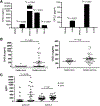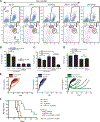Disruption of CXCR2-mediated MDSC tumor trafficking enhances anti-PD1 efficacy
- PMID: 24848257
- PMCID: PMC6980372
- DOI: 10.1126/scitranslmed.3007974
Disruption of CXCR2-mediated MDSC tumor trafficking enhances anti-PD1 efficacy
Abstract
Suppression of the host's immune system plays a major role in cancer progression. Tumor signaling of programmed death 1 (PD1) on T cells and expansion of myeloid-derived suppressor cells (MDSCs) are major mechanisms of tumor immune escape. We sought to target these pathways in rhabdomyosarcoma (RMS), the most common soft tissue sarcoma of childhood. Murine RMS showed high surface expression of PD-L1, and anti-PD1 prevented tumor growth if initiated early after tumor inoculation; however, delayed anti-PD1 had limited benefit. RMS induced robust expansion of CXCR2(+)CD11b(+)Ly6G(hi) MDSCs, and CXCR2 deficiency prevented CD11b(+)Ly6G(hi) MDSC trafficking to the tumor. When tumor trafficking of MDSCs was inhibited by CXCR2 deficiency, or after anti-CXCR2 monoclonal antibody therapy, delayed anti-PD1 treatment induced significant antitumor effects. Thus, CXCR2(+)CD11b(+)Ly6G(hi) MDSCs mediate local immunosuppression, which limits the efficacy of checkpoint blockade in murine RMS. Human pediatric sarcomas also produce CXCR2 ligands, including CXCL8. Patients with metastatic pediatric sarcomas display elevated serum CXCR2 ligands, and elevated CXCL8 is associated with diminished survival in this population. We conclude that accumulation of MDSCs in the tumor bed limits the efficacy of checkpoint blockade in cancer. We also identify CXCR2 as a novel target for modulating tumor immune escape and present evidence that CXCR2(+)CD11b(+)Ly6G(hi) MDSCs are an important suppressive myeloid subset in pediatric sarcomas. These findings present a translatable strategy to improve the efficacy of checkpoint blockade by preventing trafficking of MDSCs to the tumor site.
Copyright © 2014, American Association for the Advancement of Science.
Conflict of interest statement
Figures








Comment in
-
Immunotherapy: Two hits are better than one.Nat Rev Cancer. 2014 Jul;14(7):451. doi: 10.1038/nrc3777. Epub 2014 Jun 19. Nat Rev Cancer. 2014. PMID: 24943810 No abstract available.
-
Immunotherapy: two hits are better than one.Nat Rev Immunol. 2014 Jul;14(7):431. doi: 10.1038/nri3710. Nat Rev Immunol. 2014. PMID: 24962259 No abstract available.
References
-
- Greenwald RJ, Freeman GJ, Sharpe AH, The B7 family revisited. Annu. Rev. Immunol 23, 515–548 (2005). - PubMed
-
- Freeman GJ, Long AJ, Iwai Y, Bourque K, Chernova T, Nishimura H, Fitz LJ, Malenkovich N, Okazaki T, Byrne MC, Horton HF, Fouser L, Carter L, Ling V, Bowman MR, Carreno BM, Collins M, Wood CR, Honjo T, Engagement of the PD-1 immunoinhibitory receptor by a novel B7 family member leads to negative regulation of lymphocyte activation. J. Exp. Med 192, 1027–1034 (2000). - PMC - PubMed
-
- Nishimura H, Okazaki T, Tanaka Y, Nakatani K, Hara M, Matsumori A, Sasayama S, Mizoguchi A, Hiai H, Minato N, Honjo T, Autoimmune dilated cardiomyopathy in PD-1 receptor-deficient mice. Science 291, 319–322 (2001). - PubMed
Publication types
MeSH terms
Substances
Grants and funding
LinkOut - more resources
Full Text Sources
Other Literature Sources
Medical
Molecular Biology Databases
Research Materials

